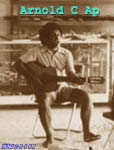I don’t care if the government won’t stay out of my life I want freedom Freedom like a bird (Deddy Dores, 1972)
It’s not easy to remain hopeful about the current music scene with lowest common denominator bands dominating the airwaves.
Then along came Those Shaking, Shocking Days. Indonesian Hard, Psychedelic, Progressive Rock and Funk: 1970-1978, released by the San Francisco-based label Now-Again Records.
The 20-song compilation, released on three vinyl LPs, includes extensive liner notes written by Canadian Southeast Asian music expert and Now-Again founder Eothen “Egon” Alapatt and Chandra Drew, an Indonesian expat in the Netherlands.
The liner notes not only remind us that – quoting rock purists – everything was better before we were born, but also that indigenous musicians’ take on rock and roll music in the 1970s was as mind-blowing as what was played by their western contemporaries, if not better.
Listening to some of the most complicated compositions ever recorded by Indonesian musicians, I could not help but think of what fans of legendary rock band Koes Plus used to say: if the band had written their lyrics in English, they would have been as big as The Beatles.
That’s an overstatement, of course, as is evident from “Mobil Tua” (Old Car), one of Koes Plus’ compositions included in the compilation. Imagine a song from The Knack on the verge of their breakup.
Digging deeper into the album’s other tracks, some of which were written by some of the nation’s most obscure bands, there’s no doubt that the songs can stand alongside any classic rock tune from the era.
We are talking about a pre-Internet and pre-FM dial era, when musical references were limited to albums from Uriah Heep, Deep Purple, Cream, Led Zeppelin, King Crimson and James Brown – all smuggled into Indonesia by a small number of rich people who traveled abroad or studied in the Western world.
After all, rock and roll has never been about originality. It took more than 30 years before late 70s garage rock went mainstream in the US with bands such as The Strokes and The White Stripes. Transmission in the 70s was more immediate and young people from small cities such as Surakarta, Palembang and even West Papua rock to the same bands.
Listen to the composition “Saman Doye” by the band and you might easily take it for a song by War, pre-Eric Burdon. It features a complex funk composition underpinned by taut rhythms from drummer Stevie M.R. and bassist Jochie Phiu and borderline histrionic guitar chops by Hengky M.S. It is easy to overlook the fact that the band hails from West Papua, one of the poorest regions of the country, then and now.
Or take The Brims, a little known band from Bandung, West Java, with “Anti-Gandja”. This song is a no-nonsense take on garage rock that sounds the meeting of the early Kinks and Led Zeppelin’s Jimmy Page. And this comes from a band so obscure that nothing is known about its members.
Another revelation is “Jeritan Cinta” by a Surakarta-based Terenchem. This heavily psychedelic track, with droning fuzz guitars that can be heard from miles away, will baffle even the most diligent ethnomusicologist in figuring out how four young folks in a medium-sized city in Central Java in the early 1970s could craft what might pass for complex King Crimson.
The whole album, however, smacks of Orientalism. It provides a vision of the music scene in Java in the early 1970s through the eyes of Western curators who handpicked music based on their ideas of how rock and roll was played in the West.
It was also equally tragic to see the hipster kids who snapped up 50 copies of the album on vinyl at its Jakarta release party were first exposed to the era through an Orientalist lens.
The current generation of music fans probably only cares about local music when it is championed by the capitalist mode of production in the West.
[Disclosure: I was turned on to “Fajar di Atas Awan”, a stunning release by the Medan-based world music duo Suarasama, only after pitchfork.com gushed about the track, which was released by uber-hip Chicago label Drag City].
Orientalism aside, this compilation is a laudable labor. It is a solid effort to catalogue the nation’s musical heritage — something that Indonesians are not good at.
The majority of the songs in the compilation would have slid into oblivion without Now-Again’s release. Even their composers did not remember some of the songs.
In the liner notes Connoy writes about “People”, a “Superstition”-era Stevie Wonder funk-rock gem, from country’s first super group, Super Kid. Recordings of the song are so rare that the band, when approached to license the song for this anthology, couldn’t remember recording or releasing it.
As the liner notes reminds us the tracks on the album reminds us that music can provide us with a valuable history lesson.
Source: www.thejakartapost.com










